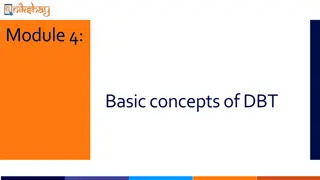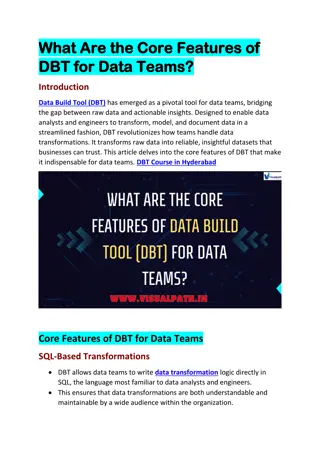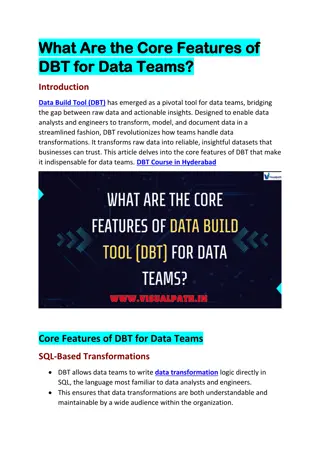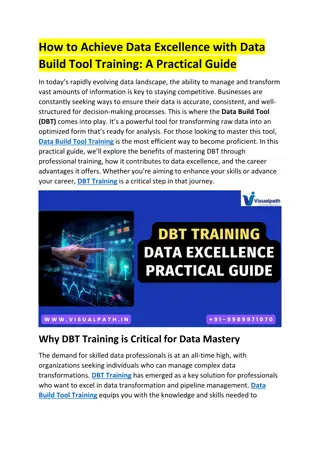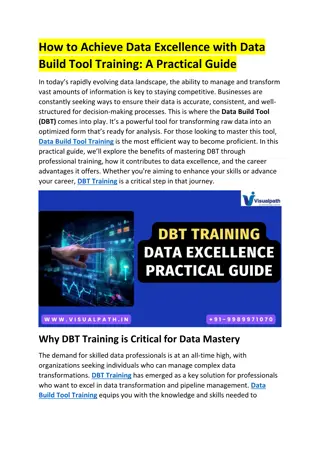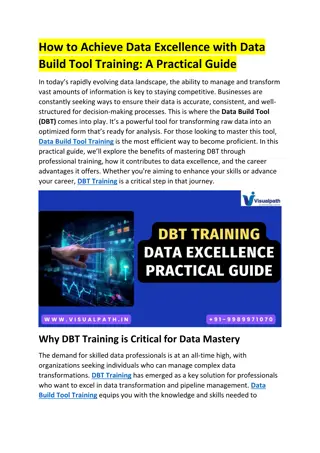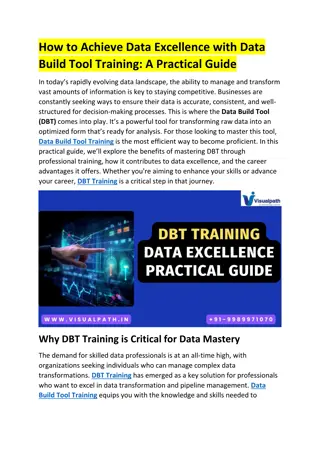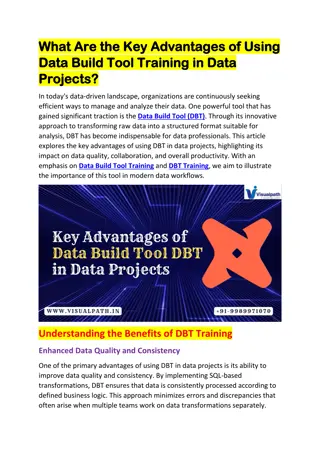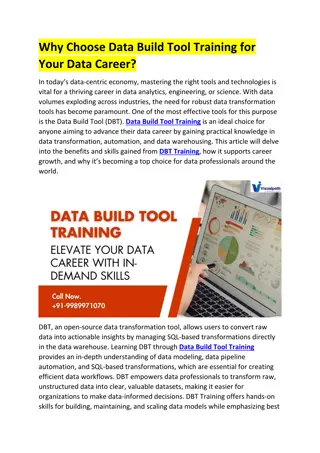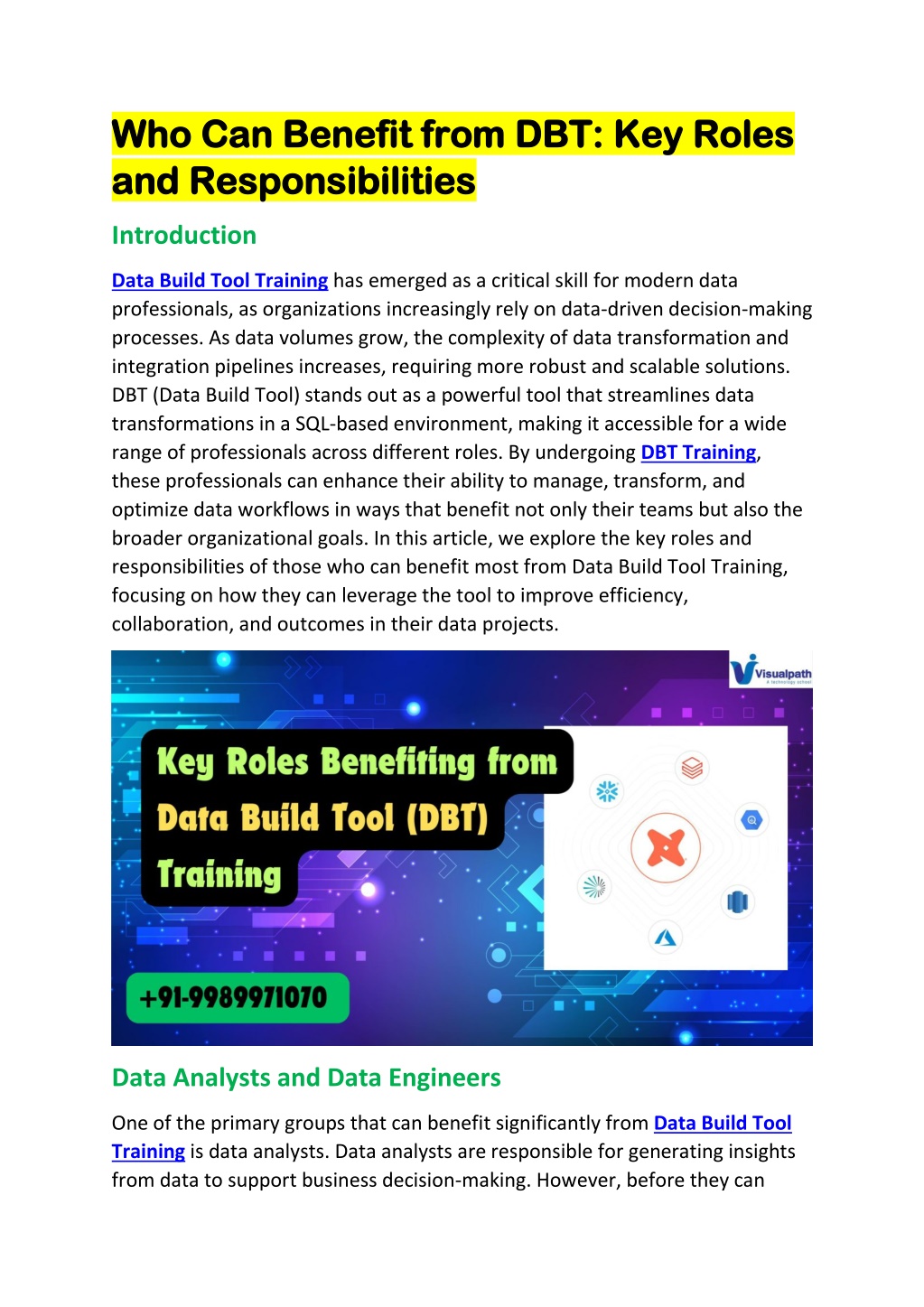
Data Build Tool Training | DBT Training
Visualpath offers top-notch DBT Training (Data Build Tool) online worldwide. Master key data transformation tools like Matillion, Snowflake, ETL, Informatica, SQL, and more. Boost your career in data engineering. Book a Free Demo call at 91-99899710
Download Presentation

Please find below an Image/Link to download the presentation.
The content on the website is provided AS IS for your information and personal use only. It may not be sold, licensed, or shared on other websites without obtaining consent from the author. If you encounter any issues during the download, it is possible that the publisher has removed the file from their server.
You are allowed to download the files provided on this website for personal or commercial use, subject to the condition that they are used lawfully. All files are the property of their respective owners.
The content on the website is provided AS IS for your information and personal use only. It may not be sold, licensed, or shared on other websites without obtaining consent from the author.
E N D
Presentation Transcript
Who Can Benefit from DBT: Key Roles Who Can Benefit from DBT: Key Roles and Responsibilities and Responsibilities Introduction Data Build Tool Training has emerged as a critical skill for modern data professionals, as organizations increasingly rely on data-driven decision-making processes. As data volumes grow, the complexity of data transformation and integration pipelines increases, requiring more robust and scalable solutions. DBT (Data Build Tool) stands out as a powerful tool that streamlines data transformations in a SQL-based environment, making it accessible for a wide range of professionals across different roles. By undergoing DBT Training, these professionals can enhance their ability to manage, transform, and optimize data workflows in ways that benefit not only their teams but also the broader organizational goals. In this article, we explore the key roles and responsibilities of those who can benefit most from Data Build Tool Training, focusing on how they can leverage the tool to improve efficiency, collaboration, and outcomes in their data projects. Data Analysts and Data Engineers One of the primary groups that can benefit significantly from Data Build Tool Training is data analysts. Data analysts are responsible for generating insights from data to support business decision-making. However, before they can
perform any analysis, they need to clean and prepare the data, which can be a time-consuming and manual process. DBT Training empowers data analysts by enabling them to automate much of this data preparation work, transforming raw data into a clean, structured format ready for analysis. With DBT's SQL- based approach, analysts who are already familiar with SQL can easily pick up the tool and start creating transformation models that ensure consistency and accuracy in their datasets. This allows analysts to focus on the core of their job analyzing data and delivering valuable insights without spending excessive time on data wrangling. Data engineers, on the other hand, play a critical role in building and maintaining data pipelines that move data across systems and prepare it for analysis. Data Build Tool Training is particularly valuable for data engineers because it enables them to create transformation logic directly within the data warehouse, simplifying the overall architecture. Traditional data transformation tools often require data to be extracted from the warehouse, transformed, and then reloaded. DBT eliminates this need by allowing engineers to build all transformations within the warehouse, reducing latency and complexity. Engineers trained in DBT can create scalable, modular pipelines that are easier to maintain and troubleshoot. Additionally, DBT s focus on version control, documentation, and testing means that engineers can create more transparent and reliable data workflows, improving collaboration with other teams, such as data analysts and scientists. Beyond streamlining workflows, DBT Training also enhances the collaboration between data analysts and data engineers. Since DBT models are written in SQL, both analysts and engineers can easily understand and modify the code, leading to better communication and faster iterations on data models. For data engineers, this shared understanding means they can work more closely with analysts to ensure that data transformations align with business needs, while analysts gain the ability to contribute more directly to the transformation process. This cross-functional collaboration ultimately leads to more efficient data teams and more accurate data products. Data Scientists and Business Intelligence Professionals Data scientists are another key group who can benefit greatly from Data Build Tool Training. While data scientists are typically focused on creating predictive models and conducting exploratory data analysis (EDA), they also need access
to clean, structured data. However, data preparation can often take up a significant portion of a data scientist s time. With DBT Training, data scientists can create repeatable, automated data transformation processes that feed clean data into their machine learning models and other advanced analytics tasks. This allows them to spend more time developing insights and less time wrangling messy data. Additionally, by adopting DBT s version-controlled, documented approach to data transformations, data scientists can ensure that their data pipelines are both reproducible and easy to modify as their needs evolve. Business Intelligence (BI) professionals also stand to gain a lot from DBT Training. BI teams are responsible for creating dashboards and reports that provide critical insights into business performance. For BI professionals, the quality of their work heavily depends on the quality and accuracy of the underlying data. DBT Training equips BI teams with the tools to build well- structured data models that are consistent across reports and dashboards, ensuring that stakeholders are always working with reliable, up-to-date information. DBT s ability to document transformation logic also improves the transparency of data pipelines, which can be especially useful when BI teams need to explain their data models to non-technical stakeholders. Furthermore, with Data Build Tool Training, BI professionals can take a more proactive role in managing data pipelines, collaborating more effectively with data engineers and analysts to ensure that data is prepared in a way that aligns with reporting needs. Project Managers and Technical Leads Project managers and technical leads overseeing data projects also benefit significantly from DBT Training. While these roles are typically more focused on strategy and oversight, having a solid understanding of data transformation tools like DBT allows them to better communicate with technical teams and make informed decisions about project timelines, resources, and goals. For project managers, DBT Training provides a foundation for understanding the complexity of data workflows, enabling them to manage expectations more effectively and ensure that projects stay on track. With a deeper knowledge of DBT, project managers can also anticipate potential bottlenecks in data processing and coordinate between teams to address these challenges before they become major issues.
Technical leads, especially those responsible for the overall architecture and data strategy, benefit from Data Build Tool Training by gaining the skills needed to design scalable and maintainable data architectures. DBT s modular approach to transformations makes it easier for technical leads to oversee large, complex data projects, ensuring that each component of the pipeline is well-documented, tested, and version-controlled. With DBT Training, technical leads can set the standard for how data transformations are handled across the organization, creating a more cohesive, efficient data strategy that aligns with business objectives. Conclusion In conclusion, Data Build Tool Training is a valuable asset for a wide range of professionals involved in data-related roles. From data analysts and engineers to data scientists, BI professionals, project managers, and technical leads, the ability to work with DBT can significantly enhance productivity, collaboration, and the overall quality of data projects. By streamlining data transformations, automating workflows, and fostering cross-functional collaboration, DBT empowers organizations to make better use of their data and drive more informed decision-making. Investing in DBT Training is not just about learning a tool; it s about adopting a best practice that ensures the long-term success of data initiatives across the enterprise. Visualpath is the Leading and Best Institute for learning in Hyderabad. We provide Data Build Tool Training. You will get the best course at an affordable cost. Attend Free Demo Call on +91-9989971070 Visit: https://visualpath.in/dbt-online-training-course-in- hyderabad.html





